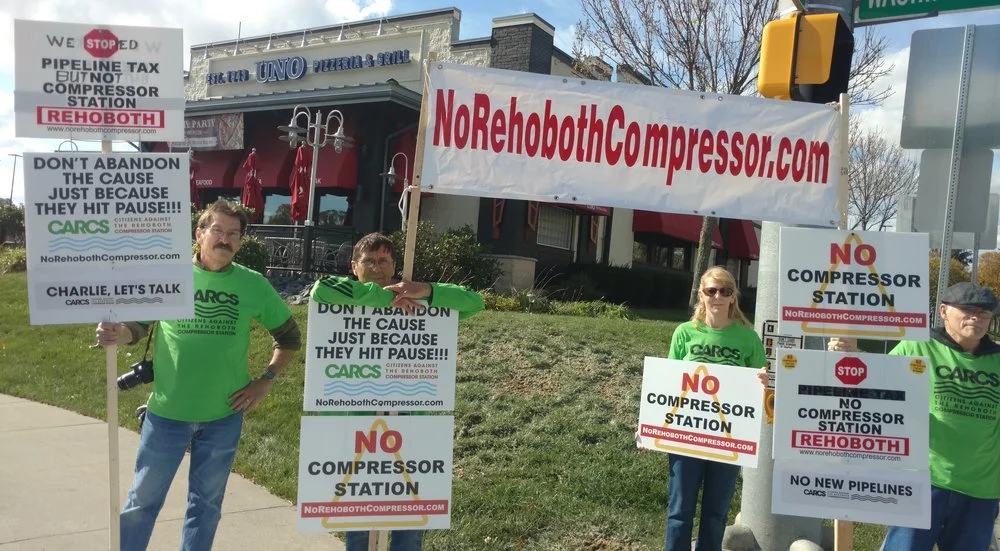Opponents of a proposed natural-gas pipeline compressor station recently protested outside a local restaurant, where Gov. Charlie Baker stumped for Attleboro's mayor.
-- Photo by Tim Faulkner for ecoRI News
Via ecoRI News (ecori.org)
ATTLEBORO, Mass.
Even though Spectra Energy Partners has withdrawn plans for a natural-gas pipeline compressor station in Rehoboth, Mass., opponents of the project don’t want it coming back.
Groups such as Citizens Against the Rehoboth Compressor Station (CARCS) have been pleading with Gov. Charlie Baker to take a stand against the compressor station and other pipeline expansions, but so far the governor has refused to bend to public pressure and oppose the natural-gas infrastructure projects proposed for the region.
CARCS activists protested Oct. 28 outside the Uno's Pizzeria & Grill on Route 1, where Baker stumped for local politicians. Baker arrived late and didn't address the demonstrators, including members of the MBTA bus maintenance union who were protesting Baker’s efforts to privatize their jobs.
The International Association of Machinists Union Local 264 protested Baker's efforts to privatize their jobs.
Attleboro Mayor Kevin Dumas was one of the politicians whom Baker has endorsed. Dumas, however, opposes the compressor project. “It’s dead and I hope it stays dead,” Dumas told ecoRI News.
Dumas, a Republican, has been an outspoken critic of the compressor station and signed a resolution opposing the project, the proposed site close to the city’s border with Rehoboth.
Baker has only said that the project is a federal decision and outside of state control. But opponents such as Brian Hatch, a lawyer from Attleboro, said Baker could do more to impede or even stop the compressor station. Recent appeals court decisions, he said, give states more say in the permitting of energy projects that are under the purview of the Federal Energy Regulatory Commission.
The site of the proposed compressor station poses a health threat to residential neighborhoods and youth who frequent the nearby park and athletic fields, Hatch said.
Kathleen Boivin of Rehoboth referred to a 2015 report by Attorney General Maura Healey showing that the growth of renewable energy and energy-efficiency improvements reduce the demand for natural gas and therefore pipeline enhancements.
Boivin said the common belief about the buildout of the Spectra pipeline isn't to provide natural gas for New England but to deliver it to export terminals north of Boston.
“There’s no need for our communities to bear the health, environmental, and financial detrimental effects of this additional infrastructure when it’s not needed,” she said.
Last week CARCS members also hand-delivered a petition signed by 2,500 opponents of the compressor to Baker’s office in Boston.
CARCS Director Tracy Manzella said after 19 months of organized opposition Baker hasn't budged.
“We’ve gone door to door, staged countless community events, sponsored letter-writing campaigns, given interviews, published articles, met with local, state, and federal government officials, drafted bylaws, and even given a Powerpoint presentation at the governor’s executive office of Energy and Environmental Affairs, but the governor himself? So far, no luck.”
The proposed 10,320-horsepower Rehoboth compressor station was halted by Houston-based Spectrain June. The project was one of several Access Northeast projects paused along the Algonquin pipeline. The compressor station was proposed for a privately owned, 120-acre site close to Attleboro and Seekonk, and Pawtucket, R.I., and about 10 miles from downtown Providence.
The projects were withdrawn because of financing trouble, created when the Massachusetts Supreme Judicial Court ruled that a plan by National Grid and Eversource to charge electricity customers for the projects was unconstitutional. It’s expected that Spectra, National Grid, and Eversource will revive the projects if a new funding scheme is approved.
Tim Faulkner is reporter/writer for ecoRI News.










